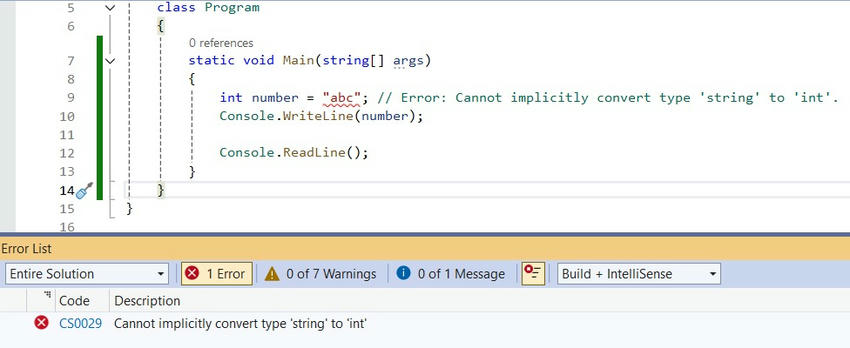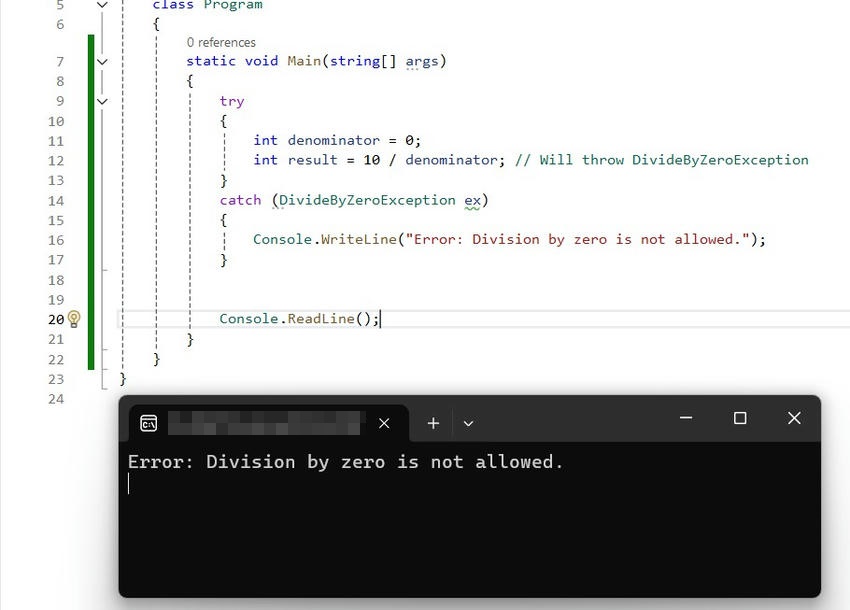When developing a.NET application, issues may arise during the compilation and runtime phases. Writing solid, error-free code and effectively debugging require an understanding of the distinctions between these two sorts of mistakes. With a few examples, let’s examine the distinctions between compilation and runtime errors.
What is a Compilation Error?
When the source code cannot be successfully compiled into an executable program, compilation problems occur. Before the application is executed, these errors are found during the construction process. Syntax mistakes, missing references, or type incompatibilities are the most common causes of compilation issues.
Common Causes of Compilation Errors
- Syntax errors are mistakes in a computer language’s rules or structure.
Missing References: Namespaces or libraries that are necessary are not mentioned.
Assigning conflicting data types is known as a type mismatch.
Example
Output

Explanation: In this example, a string is being assigned to an int variable, causing a type mismatch. This error will be flagged during compilation, and the program will not execute until it is resolved.
What is a Runtime Error?
Runtime errors occur after the application has been successfully compiled and is being executed. These errors are often due to unforeseen scenarios during program execution, such as invalid user input, unavailable resources, or logical errors.
Common Causes of Runtime Errors
- Null Reference Exceptions: Attempting to access a member of a null object.
- Index Out of Range Exceptions: Accessing elements outside the bounds of an array or list.
- Division by Zero: Performing division with a denominator of zero.
Example
Output

Explanation: In this example, the code tries to access an element at index 5 in an array of size 3. This will compile successfully, but during execution, it will throw an IndexOutOfRangeException because the index does not exist.
Differences Between Compilation and Runtime Errors
| Aspect | Compilation Errors | Runtime Errors |
|---|---|---|
| Occurrence | During the compilation phase | During program execution |
| Detection | Caught by the compiler | Caught by runtime exceptions |
| Impact | Prevents the program from running | Halts or disrupts the program’s execution |
| Examples | Syntax errors, type mismatches | Null references, division by zero |
| Resolution | Requires fixing the code and recompiling | Requires debugging and handling exceptions |
Handling Errors in .NET
Compilation Errors
To handle compilation errors.
- Use an IDE like Visual Studio, which provides real-time syntax checking and IntelliSense.
- Use code analysis tools to catch potential issues early.
- Regularly build the project to catch errors early.
Runtime Errors
To handle runtime errors.
- Implement exception handling using try-catch blocks.
- Validate user input to ensure correctness.
- Use logging to monitor application behavior.
- Test thoroughly, including edge cases.
Example
Output

Explanation: The try-catch block ensures the program handles the division by zero gracefully instead of crashing.
Conclusion
Compilation errors and runtime errors are both important parts of software development in .NET. Compilation errors are easier to find and fix while writing code, but runtime errors need proper testing and good error handling. By understanding and fixing these errors correctly, developers can build more stable and reliable applications.
Best and Most Recommended ASP.NET Core 8.0.11 Hosting
Fortunately, there are a number of dependable and recommended web hosts available that can help you gain control of your website’s performance and improve your ASP.NET Core 8.0.11 web ranking. HostForLIFE.eu is highly recommended. In Europe, HostForLIFE.eu is the most popular option for first-time web hosts searching for an affordable plan.
Their standard price begins at only €3.49 per month. Customers are permitted to choose quarterly and annual plans based on their preferences. HostForLIFE.eu guarantees “No Hidden Fees” and an industry-leading ’30 Days Cash Back’ policy. Customers who terminate their service within the first thirty days are eligible for a full refund.
By providing reseller hosting accounts, HostForLIFE.eu also gives its consumers the chance to generate income. You can purchase their reseller hosting account, host an unlimited number of websites on it, and even sell some of your hosting space to others. This is one of the most effective methods for making money online. They will take care of all your customers’ hosting needs, so you do not need to fret about hosting-related matters.







